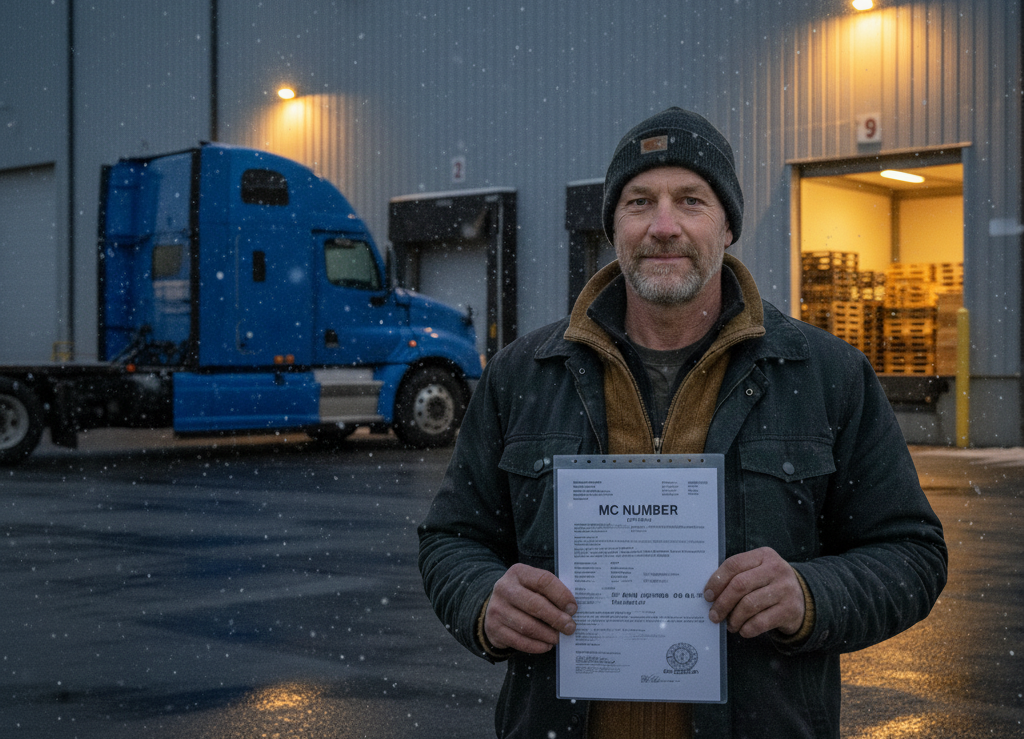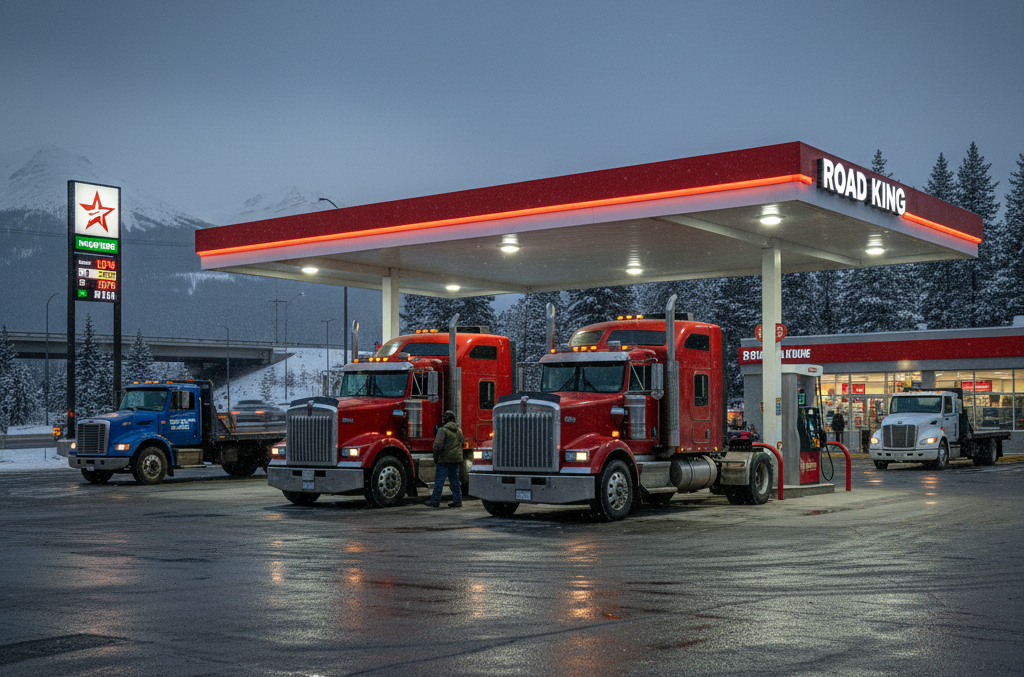The world of trucking can offer freedom and opportunity for individuals who are ready to embrace its challenges. Still, navigating this sector can be challenging amid strict regulations and safety standards. For owner-operators and self-employed drivers, securing consistent and profitable loads is an essential aspect of reaching success.
Unlike drivers hired by trucking companies, owner-operators have to manage their own operations. This includes maintaining their trucks, ensuring proper insurance, and finding and hauling loads. Usually, securing truckloads is a top priority, as it maintains profitability and ensures meeting financial obligations.
The article reviews different ways how independent truckers find loads and plan their operations for a stable success.

Who is the Owner-Operator?
An owner-operator is an independent truck driver who owns and operates a trucking business. Usually, they own a single truck, while some may manage a small fleet. Unlike truckers employed by a carrier, owner-operators are responsible for all business aspects. This includes maintenance, regulatory compliance, insurance coverage, and load acquisition. This independence allows them to maximize their earnings. On the other hand, it requires thorough planning to ensure a steady income.
Owner-operators, like other commercial drivers, are the backbone of the logistics, connecting shippers, carriers, and end customers. Their success is based on their ability to secure profitable loads while managing expenses effectively. This balance is what makes the owner-operator’s role both rewarding and challenging.
How to Find Loads as an Owner-Operator
As we know, securing a steady flow of available loads is the cornerstone of any owner-operator’s success. Without a steady stream, it’s challenging to cover operating costs, such as maintenance, insurance, and truck payments. However, finding trucking loads for owner-operators isn’t just about quantity. It’s about security, the right truckloads that can maximize your revenue while minimizing expenses.
Owner-operators have several options for finding loads, ranging from a load board to more direct approaches. Each strategy has its pros and cons, while the best approach depends on your goals, experience, and market conditions.
Working with Freight Brokers
Freight brokers can act as intermediaries between shippers and carriers. They help companies find reliable transportation options for their goods and assist carriers, including independent truckers, in securing loads. Cooperating with freight brokers can be a highly effective strategy.
Freight brokers offer access to a wide network of shippers and often have available loads. This can save truckers’ time and effort when searching for work. However, this strategy affects income, as freight brokers usually take a percentage of the freight rate as a fee.
The pros of these options included the following:
Access to a wide load range. Brokers often have established connections with shippers. This provides a broader selection of available loads, including those that might not have been able to independent truckers.
Time-saving. Instead of spending hours searching for truckloads, owner-operators can rely on brokers to find and book freight. This reduces time, allowing us to focus on driving and delivering.
Reduced administrative burden. Freight brokers can handle the paperwork, including contracts, rate negotiations, and freight bills.
Payment assurance. Freight brokers often offer quick-pay options or facilitate payments within a set timeframe, reducing the risk of payment delays or disputes.
However, before partnering with a specialist, you should understand the possible cons of this:
Reduced earnings. Brokers take a commission of 10-25% of the freight rate, which can significantly impact truckers’ profitability.
Limited control. Brokers negotiate compensation with shippers on behalf of the carriers. Thus, owner-operators may have less influence over pricing.
Unreliable brokers. Not all freight brokers are reputable. Thus, it’s crucial to vet the specialist carefully.
Using Dispatch Services
Dispatch services can provide a valuable solution for owner-operators. They act as personal assistants, helping find loads, negotiating rates, handling paperwork, and optimizing delivery schedules. Dispatchers monitor load boards and connect with freight brokers or shippers to find truck loads that fit the owner-operator’s preferences. They also assist with route planning and ensuring compliance with delivery deadlines.
The pros of dispatch services include the following:
Professional rate negotiation. Experienced dispatchers have a strong reputation for negotiation skills and knowledge. They can secure higher freight fee.
Administrative support. Dispatch services often handle paperwork, billing, and compliance documentation. This simplifies the administrative burden for owner-operators.
Route optimization. Dispatchers use their expertise and innovative technologies to plan efficiently, saving your expenses and time.
Access to a broad network. Dispatchers have established relationships with freight brokers and shippers. This assistance ensures owner-operators with access to a wider range of the latest available loads.
On the other hand, using dispatch services can include a range of negative factors:
Service fees. Dispatchers charge a fee, usually 5-12% of the load revenue. This can reduce the owner-operator’s income.
Dependence on service. Relying heavily on a dispatcher can make an owner-operator less self-sufficient.
Loss of control. By outsourcing load acquisition and negotiations, independent truck drivers may have less control over the truckloads.
Networking through Trucking Associations
Trucking associations bring together professionals across the trucking sector. This includes drivers, owner-operators, fleet managers, shippers, and freight brokers. These associations offer opportunities to network, stay informed about logistics trends and regulations, and access tools to enhance their businesses. With a membership, truckers can become a part of a supportive community and gain insights valuable insights.
Owner-operators can build valuable relationships and ensure new opportunities by attending conferences, participating in online forums, or connecting with peers. In addition, some associations may provide access to private load boards, discounted services, and advocacy efforts. Thus, it is one of the options for how truckers find loads.
The advantages of membership in trucking associations include:
Access to exclusive load opportunities. Trucking associations may have private load boards, offering members access to exclusive truck loads. This often involves less competition and better rates.
Establishing professional connections. Networking events, seminars, and forums allow owner-operators to connect with shippers, brokers, and other carriers.
Cost-saving opportunities. Membership often includes discounts on essential services and products, such as fuel cards and lower insurance premiums.
Up-to-date insights. Associations keep members informed through newsletters, reports, and market analyses. This may include news on market trends, regulations, and technological advancements.
However, you may face these challenges:
Membership fees. Joining an association requires an annual or monthly membership fee. This can be challenging for newcomers.
Time commitment. To obtain a full range of benefits, members have to participate in events, training, and networking opportunities.
Variable load quality. Private load boards provide access to exclusive opportunities. However, their quality and profitability may vary.
Becoming Government Contractor
Becoming a government contractor can be a suitable option for those who are seeking steady freight opportunities. Government agencies often require transportation services for various goods, from military supplies to medical equipment. These contracts often provide long-term stability and competitive pay rates.
To qualify, commercial drivers must register through specialized systems like the System for Award Management (SAM) and meet specific requirements. For instance, compliance with safety and operational standards is often included. Some contracts may prioritize veteran- or minority-owned trucking businesses.
The pros of this strategy of securing loads include:
Stable income. Government contracts often cover months or years, providing a steady stream of truckloads.
Competitive pay. Rates for government freight tend to be higher than market averages.
Exclusive opportunities. Contracts can cover various cargo types, from standard goods to specialized hauls.
The cons of being a government contractor may involve:
Strict requirements. Compliance with strict regulations and qualifications is the main requirement.
Long application process. The process of securing government contracts can be time-consuming.
High competition. Government contracts often attract many bidders. Thud, it can be difficult to stand out.
Specializing in High-Demand Cargo Types
The other effective way for owner-operators to secure consistent and high-pay truck loads is by specializing in high-demand cargo types. You can obtain additional qualifications to handle hazardous materials (hazmat), oversized or overweight loads, and time-sensitive shipments. Specializing in these areas can help you differ from the competition, allowing you to charge premium rates.
Examples of High-Demand Cargo
Temperature-sensitive goods. Transporting perishable goods in refrigerated trucks (reefers) is an important part of the food and pharmaceutical industries.
Hazardous materials. Shipping chemicals, fireworks, or other hazardous items requires special certifications and safety measures.
Oversized or overweight hauls. This type of cargo requires careful planning of loading and unloading, obtaining special permits, and adhering to routing regulations. Examples of this cargo type are large machinery or construction equipment.
Time-sensitive freight. Expedited shipments, such as medical supplies or critical manufacturing components, demand fast and reliable delivery.
The benefits of hauling niche cargo can be:
Higher-income potential. High-demand cargo often involves better pay. For instance, refrigerated or hazmat freight commands higher rates amid the need for specialized equipment and certifications.
Consistent load availability. Industries like food or pharmaceuticals have ongoing needs for specialized transportation. Thus, truckers can easily find available lauds to haul.
Stronger market position. Specializing in niche markets can help an owner-operator build a reputation as an expert. This can lead to long-term contracts.
Increased business stability. High-demand cargo types are often less affected by market fluctuations. This ensures a more stable income.
Challenges of specialization include:
Initial investment. Specialized equipment like reefers, flatbeds, or tankers can be costly. Additionally, carriers may need to invest in learning and certifications, such as hazmat endorsements.
Increased responsibility. Specialized cargo often comes with higher risks, including stricter compliance requirements and potential liability for damages.
Ongoing training. Staying compliant with regulations and maintaining certifications needs time and effort. For example, hazmat transporters must undergo regular training.
Importance of Route Planning and Load Optimization
Route planning and load optimization are essential component of being an owner-operator I the trucking industry. This can maximize your profitability and ensure efficient operations. Effective route planning involves selecting the best option to reduce empty miles, avoid traffic, and minimize fuel costs. Load optimization focuses on maximizing cargo space and weight capacity to boost earnings per trip.
Planning involves avoiding adverse weather conditions or high-traffic roads, finding the most efficient route, and planning stops ahead. Careful planning can also enhance customer satisfaction, ensuring on-time deliveries.
Tools and Strategies
Morand GPS and load optimization software scans simplify these processes by offering real-time updates and efficient load-matching. Staying flexible and adjusting plans as conditions change further enhances operational efficiency.
With these practices, owner-operators can reduce operational expenses and deadhead miles, boost revenue, and stay competitive in the sector.
Adapting to Industry Trends and Technology
The trucking industry is a sector that is constantly evolving, driven by technological advancements and shifting market demands. For power operators, competition involves a proactive approach to adopting new tools and strategies. Innovation improves efficiency and provides new opportunities to grow and sustain the trucking business.
Key Industry Trends
Leveraging technology. Technologies have streamlined a range of trucking factors, from advanced GPS systems to load-matching platforms. These tools help independent truckers optimize routes, reduce fuel consumption, and search truckloads more efficiently.
Rise of electric vehicles. Electric trucks are gaining traction as trucking companies seek to reduce emissions. In addition, autonomous vehicles, while still developing, promise to reshape the logistics.
Focus on sustainability. Shippers and carriers are prioritizing eco-friendly practices. Owner-operators can benefit by adopting fuel-efficient practices and considering electric trucks to meet the growing demand for green logistics.
Conclusion
Securing a load as an owner-operator requires strategic planning, commitment to continuous improvement, and the maintenance of reliable connections across the sector. From finding truckloads through dispatch services to exploring opportunities as a government contractor or specializing in high-demand freight, independent truck drivers have various options to maximize their income.
Equally important is the use of technology for planning, load optimization, and staying ahead of trends in logistics. By embracing innovation and maintaining strong financial and business strategies, owner-operators can navigate the challenges of the trucking industry while building a profitable business and enhancing customer experience.




